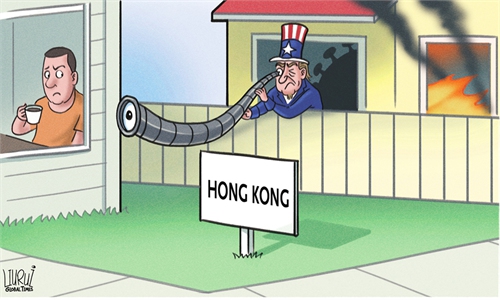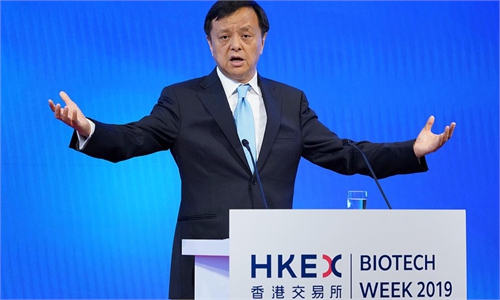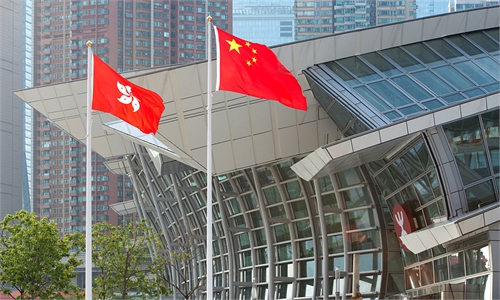
Hong Kong government holds an oath-taking ceremony for undersecretaries and political assistants on Wednesday. Witnessed by Chief Executive Carrie Lam, the 12 undersecretaries and 14 political assistants vowed to uphold the Basic Law of the Hong Kong Special Administrative Region (HKSAR) and swore allegiance to the HKSAR. Photo: AFP
The US-introduced Hong Kong People's Freedom and Choice Act of 2020 failed to be passed by US Congress on Friday.
This result illuminates an emerging trend in US policies toward Hong Kong since Joe Biden was elected - and what might transpire when he takes office.
Since 2019, two Hong Kong acts were approved in the US when the two houses held bipartisan agreement over Hong Kong-related issues. US President Donald Trump signed the two acts, as he was given no other option as both the Senate and the House of Representative unanimously passed the two bills.
But this time, something is different. Though the House of Representatives passed the freedom and choice bill, the Senate dominated by Republicans voiced opposition to it. This revealed the contradictions and disputes between the two parties in their stances. It also demonstrates that the Trump administration's policies are unsustainable.
Different from the previous acts, the freedom and choice bill provides for temporary protected status and refugee status. Is the US willing to continuously use its resources on Hong Kong? The answer is simply, "No." It only wants to leave a mess in the city, and threaten and pressure the Chinese central government by supporting the oppositions of Hong Kong. By doing so, Washington aims to disrupt China's pace of development.
This being the case, the two acts passed were Washington's gesture against the extradition bill which had already been withdrawn and the national security law for Hong Kong passed by China's legislature. However, the US adheres to lip-services over Hong Kong. This means there will be objections from within the US when rioters and others in Hong Kong who endanger their city may be given a certain status in the US. American politicians don't want US immigration policy to be impacted.
The two acts passed were meant to get the US more "tools" against China and give spiritual support to secessionists and rioters in Hong Kong. But there is a chance that such people would be accepted by the US. Apparently, this situation needs to be reappraised if they will become domestic political burdens, or even bring political risks to larger US interests.
The Trump administration has been playing the Hong Kong card to disturb the development of China and bring chaos to Hong Kong. It has not been in the interests of the US to provide substantive protection to or take full responsibility for Hong Kong secessionists. In the past, the "internal and external linkage" formed by verbal support did not cost the US anything. Now, however, the bill requires that the US provides temporary protected status and refugee status for certain Hong Kong people. In the future, immigration issues will also be involved, and the US is unwilling to bear the costs.
In addition to interfering with China's development, US politicians and lawmakers hope to boost political status and exploit political gains on the basis of no conflicts or damages to their personal interests. Most American lawmakers take the democratic deficit theory as the premise of judgment. They stress that the root cause of Hong Kong's problems lies in the lack of democracy. They know nothing about what real democracy is, while they point an accusing finger at China.
Samuel Muk-Man Chu, a secessionist wanted on suspicion of secession or colluding with foreign forces, begged the US to accept more secessionists at a Senate hearing Wednesday before the Senate vote, according to Hong Kong media. The US is unlikely to offer any substantive protection for these secessionists. It will only continue to give them moral support at best. That may be a political incentive for the rebels, but they can expect nothing more than empty rhetoric.
The bill is likely to be reintroduced in the Senate next year, but the transfer of political power will bring uncertainty. If the Senate remains in the Republican majority before the midterm elections, the bill will probably not be passed since the two parties tend to contradict each other by their very nature. The first way the bill can be passed is if both houses of the Congress agree on everything about Hong Kong. This will put pressure on the White House to approve the bill. The second matter concerns whether president-elect Joe Biden, as a Democrat, has a strong will to reconcile the two houses through political exchanges if the Congress cannot agree on a single position. However, the election has left politicians on both sides of the aisle with ulterior motives. This makes it harder to resolve big differences on some issues.
The author is an expert on Hong Kong, Macao and Taiwan from Nankai University. opinion@globaltimes.com.cn



